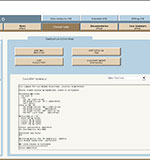Enabling Medication Therapy Management
As a pharmacist, you are probably aware of the Medicare Modernization Act (MMA), which requires sponsors of Medicare Part D to include Medication Therapy Management (MTM) systems designed to optimize therapeutic outcomes for targeted beneficiaries. As part of the MMA:
-
Pharmacists can bill for professional MTM services provided to patients, including the development of individual prescription drug plans (PDPs). PDPs are designed to improve medication use and reduce adverse drug events and interactions.
-
Reimbursement levels are expected to be $1–3 per minute for professional MTM services.
-
Each MTM transaction is tracked and taxed, creating revenue for the pharmacist each time an MTM encounter is completed.
-
Prescription drug providers are required by law to reimburse pharmacists for MTM services provided.
While the pharmaceutical industry sees great value in deploying an MTM system, there are many barriers to success:
-
Implementation is very costly and error-prone.
-
Administrative burden outweighs any increase in revenue.
-
Manual billing is prone to errors, including oversight and missed opportunities for re-billing rejected claims.
-
Training is costly and time-consuming.
-
Pharmacies are often unable to easily and effectively identify patients who may benefit from MTM services, either currently or in the future; this creates a losing situation for both patients and pharmacists.
To help pharmacists overcome these obstacles, IQware developed a comprehensive, HIPAA- and HITECH Act-compliant health information delivery system for MTM plans. Providing a secure audit trail and comprehensive reports for reimbursement, the IQware MTM solution:
-
Eases administrative and reporting burdens through automation – Pharmacists have more time with patients and increased revenue opportunities
-
More MTM patients = more MTM revenue for the pharmacist
-
Tracks and taxes each MTM transaction – Creating revenue for the pharmacist each time an MTM encounter is logged into the system
-
Tracks adverse drug effects and interactions – Specifically targets and maximizes positive patient outcomes, thereby reducing negative consequences of drug interactions
-
Integrates seamlessly with all existing pharmacy systems
-
Installs without cooperation with or intervention from current vendors
-
Complies with HIPAA, HITECH, and PDP rules and regulations – Offers a complete audit trail of all transactions for governmental reporting and filing requirements
-
Offers 100% resistance to desktop viruses hackers – With built-in security at the software level
-
Identifies "dual eligibles" – Alerts the pharmacist to lapsed or late payments by PDPs
-
Identifies patients within the current population who could benefit from MTM services currently or in the future
|
Deploying a Risk Evaluation and Mitigation Strategy
As defined in the Food & Drug Administration Amendments Act (FDAAA), drug manufacturers must create a risk evaluation and mitigation strategy (REMS) for certain new drugs they release to the market. The REMS must include a communication plan, and may include a MedGuide, patient package insert, and other elements to ensure safe use.
To mitigate a specific serious risk listed in the labeling of a drug, safe-use elements may require the following:
-
Healthcare providers prescribing the drug must have specialized training or experience or are certified.
-
Pharmacies, practitioners, or healthcare settings dispensing the drug are specially trained and/or certified.
-
The drug is dispensed to patients in certain healthcare settings only, such as hospitals (i.e., through a restricted distribution program).
-
The drug is dispensed to patients with evidence or other documentation of safe use conditions, such as laboratory test results.
-
Each patient using the drug is subject to certain monitoring and/or enrolled in a registry.
-
Physicians who prescribe and/or pharmacists who dispense the drug are enrolled in a registry.
Because each REMS is created independently by the affected medication's manufacturer, REMS lack standardization in program design and implementation. The result is a growing number of disparate, inconsistent programs, which in turn are creating provider confusion, implementation inefficiencies, workflow ineffectiveness, and burdens on the healthcare system. These burdens have the potential to reduce patient access to medications, as they may limit provider participation.
To help reverse these trends and better design, deploy, and manage REMS, IQware developed Performance Linked ACESS Systems, a standardized system of REMS tools. The IQware system:
-
Facilitates the REMS process – Stakeholders can provide input earlier in the REMS design and development process
-
Streamlines REMS implementation for stakeholders – While also reducing the burden on the healthcare system
-
Tracks provider qualification – Including courses taken, testing, and accreditation
-
Track patient enrollment – Documents qualifications, maintains patient health record, and stores lab values
|



 Email this page to friend
Email this page to friend
 Print this page
Print this page



